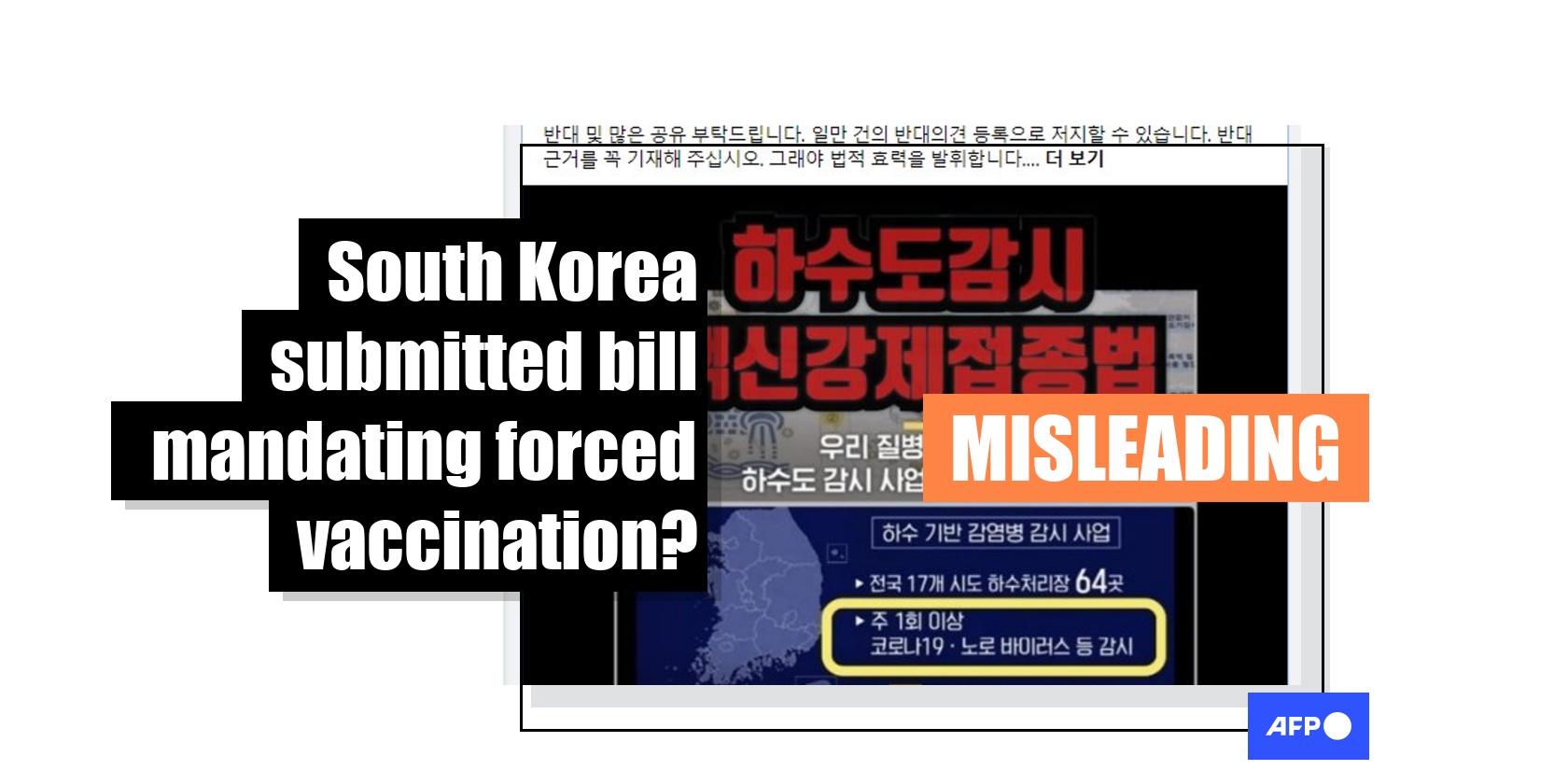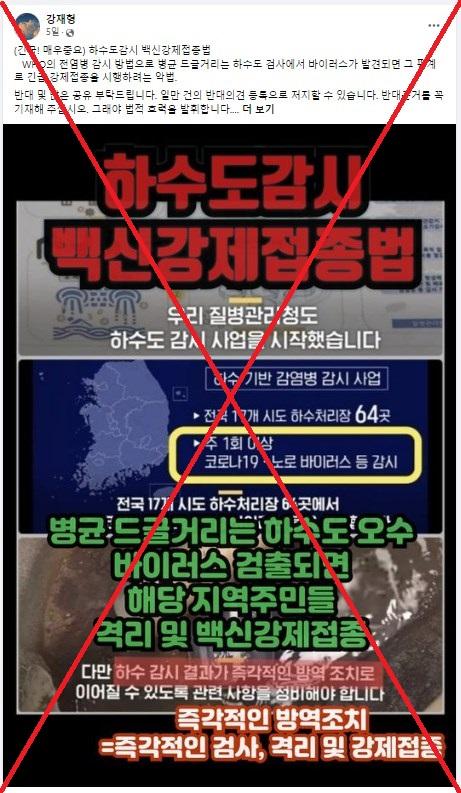
South Korean wastewater bill does not 'mandate vaccinations' in virus-hit zones
- This article is more than two years old.
- Published on May 3, 2023 at 09:08
- 4 min read
- By SHIM Kyu-Seok, AFP South Korea
"An evil law that attempts to introduce emergency forced vaccinations in areas where viruses were found in sewer water using WHO inspection methods," reads the Korean-language claim shared here on Facebook on April 20, 2023.
The post includes a graphic comprised of apparent screenshots from news broadcasts, with overlayed text that reads, "Sewer surveillance and forced vaccination law. It mandates quarantine and forced vaccinations for residents of areas where viruses were found in sewer water."
A highlighted caption in the screenshot translates as: "But the relevant regulations must be revised in order to ensure test results are translated into immediate action".
Overlayed text embedded below this reads: "Immediate action = immediate testing, quarantine and forced vaccinations."

Identical misleading claims were shared here on Facebook, here on Naver Blog and here on DC Inside, a popular South Korean forum.
Proposed bill
The misleading Facebook post links to a page on the website of the National Assembly, South Korea's legislature, about the supposed controversial bill on wastewater testing (archived link).
The full draft of the bill is available for public viewing on the website, indicating it was submitted by opposition Democratic Party lawmaker Kim Young-jin (archived link).
The bill's introduction reads in part: "(This bill) proposes to include disease and narcotic substances testing to the regular tests conducted on sewage wastewater, and introduces the means by which the procedures and methods for expedient tests can be decided on in order to safeguard the public's health and safety."
There is no mention of "forced quarantine" or "forced vaccinations" anywhere in the bill.
A spokesperson for Kim's office also called the claims about forced vaccinations and quarantine "puzzling" as "the bill has nothing to do with responsive measures" (archived link).
Adding that the lawmaker's office had been "inundated by odd complaints about this claim," the spokesperson told AFP on April 25 that "all this bill does is include a few more subjects for wastewater testing at sewage facilities, such as disease-causing viruses and narcotic material."
"Anything about vaccinations or such would certainly not be included in a bill about sewage," they said.
Wastewater testing
The graphic seen in the misleading posts also includes screenshots from a news report about the Korea Disease Control and Prevention Agency (KDCA)'s announcement it would begin testing wastewater at least once a week for viruses including Covid-19, not related to Kim's bill.
AFP found the screenshots corresponded to scenes from a news report by South Korean broadcaster SBS published on YouTube on April 5 (archived link).
The two-minute, 20-second video states the KDCA began testing wastewater for viruses on April 5, but makes no mention of forced vaccinations, quarantine or the proposed bill.
According to a KDCA press release on the testing from April 5, the agency began regular testing on wastewater once a week at 64 sewage treatment facilities nationwide (archived link).
Wastewater samples are to be collected at the facilities and transferred to labs where they are tested for disease-causing viruses like Covid-19, norovirus, or influenza.
The press release also does not say the project mandates forced vaccinations or quarantines, nor mentions what measures are to be implemented if viruses are indeed found in the wastewater.
A KDCA spokesperson also told AFP on April 26 there was "absolutely no basis" to the claim, saying the agency's wastewater inspection project "does not involve subjecting residents to forced vaccinations or quarantine."
"With Covid-19 infections winding down recently, this is a new method we've implemented that allows us to preemptively detect the spread of viruses in society without the involvement of invasive measures that may disrupt the public's livelihood," the spokesperson said.
Commenting on the agency's protocol in the event disease-causing viruses are found in wastewater samples, the spokesperson said: "The presence of viruses in the water does not necessarily mean these viruses have yet infected the population, so in that event, we would have to conduct further tests to check for (the viruses) prevalence."
With regards to vaccinations, "they've always been voluntary, and (health authorities) have never made people vaccinate against their will."
The KDCA testing was also "unrelated" to Kim's bill on wastewater testing, the spokesperson said, adding he wasn't even aware of the existence of this bill.
Kim's office too was unaware of the KDCA's wastewater testing project, acknowledging the similarity between the bill and KDCA's testing was coincidental.
Forced vaccinations
Vaccinations have never been legally mandated in South Korea.
However, the government's past requirement for vaccine passes to enter certain public areas has been criticised by medical and legal experts, and has been challenged in several high-profile court cases.
Opponents claimed the measure contradicted basic freedoms enshrined in the country's constitution (archived link).
"Many people are unable to be vaccinated for various personal reasons, but the vaccine pass requirements (at the time) discriminated against these people by effectively forcing people to get them in order to access public places," said Kim Woo-joo, a professor at the Korea University Hospital's Division of Infectious Diseases in Seoul.
Copyright © AFP 2017-2026. Any commercial use of this content requires a subscription. Click here to find out more.
Is there content that you would like AFP to fact-check? Get in touch.
Contact us
